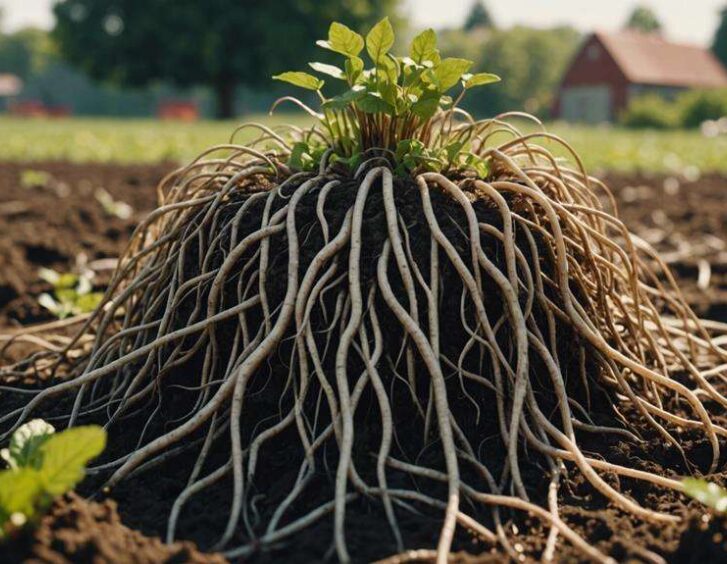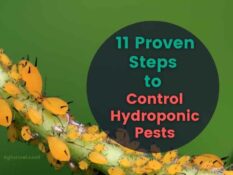As you inspect your garden or crops, you're likely to encounter tiny worms that can either be beneficial or detrimental to your plants, with root-knot nematodes being a significant threat that can lead to stunted growth, wilted tissue, and reduced yields. To identify infestations, look for galls on roots and stunted growth. Prevent nematode spread by regularly inspecting plants and tools, cleaning and disinfecting tools after each use, and inspecting soil and new plants. To manage infestations, remove infected plants, apply beneficial nematodes, and plant resistant cover crops. By understanding these strategies, you'll be better equipped to protect your plants and explore more effective ways to keep root-knot nematodes under control.
Key Takeaways
• Identify root-knot nematodes by looking for stunted growth, wilted tissue, and round galls on plant roots, especially in tomatoes and potatoes.
• Inspect plants, tools, and soil regularly to prevent root-knot nematode introduction and spread.
• Remove infected plants, apply beneficial nematodes, and plant resistant cover crops to manage infestations strategically.
• Solarize the soil to kill nematodes by trapping the sun's heat, a non-chemical control method.
• Know the nematode species in your garden to determine safe plants to grow and choose effective prevention strategies.
Understanding Nematode Basics
As you explore the world of nematodes, it's vital to understand that these tiny worms, with over 25,000 known species, can thrive in diverse environments and feed on a wide range of sources. You'll find them in almost every habitat, from soil to freshwater, and even inside other organisms.
Some nematodes are beneficial, helping to break down organic matter, while others, like root-knot nematodes, can be harmful to plants. To effectively manage these pests, it's important to understand their biology and behavior.
Root-Knot Nematode Characteristics
Root-knot nematodes, belonging to the Meloidogyne genus, wreak havoc on your garden by inducing characteristic gall-like swellings on plant roots, ultimately impacting a wide range of plants, from vegetables like tomatoes and peppers to zucchini.
These microscopic worms are highly adaptable, surviving in diverse conditions and feeding on various sources. As a gardener, it's essential to understand that different species of root-knot nematodes target specific host plants.
For instance, the Southern root-knot nematode is notorious for attacking tomatoes, while the Northern species affects potatoes. Being aware of the nematode species in your garden helps you determine which plants are safe to grow.
Identifying Infestation Symptoms
You'll typically notice stunted growth, wilted tissue, and round galls on roots, which are telltale signs of a root-knot nematode infestation. As you inspect your plants, look for these symptoms to identify potential problems.
Stunted growth can be subtle, so pay attention to plants that seem smaller or weaker than they should be. Wilted tissue is often accompanied by yellowing or browning leaves.
The most distinctive symptom, however, is the presence of round galls on roots. These galls can be small and scattered or large and numerous, depending on the severity of the infestation. By recognizing these signs, you can take action to prevent the nematodes from spreading and causing further damage to your plants.
Prevention Through Inspection
Inspecting your plants and tools regularly can help prevent the introduction of root-knot nematodes into your garden. By doing so, you'll reduce the risk of these pests causing harm to your plants.
When inspecting your plants, look for signs of infestation like galls on the roots or stunted growth. Check your tools for any nematode eggs or larvae that might be attached to them. Clean and disinfect your tools after each use to prevent the spread of nematodes.
Additionally, inspect the soil and any new plants you bring into your garden for signs of infestation. By being proactive, you can prevent root-knot nematodes from taking hold and causing damage to your plants.
Managing Infestations Strategically
Once you've identified an infestation, it's time to take action, and there are several strategies you can use to manage root-knot nematodes effectively.
You can start by removing infected plants and disposing of them properly to prevent the nematodes from spreading.
Applying beneficial nematodes, which attack and kill root-knot nematodes, is another effective strategy.
You can also try planting resistant cover crops, which can help reduce the nematode population.
Additionally, solarizing the soil by trapping the sun's heat under a tarp can help kill the nematodes.
Common Root-Knot Species
Four main species of root-knot nematodes, including the Southern, Northern, Javanese, and Peanut root-knot nematodes, cause damage in the U.S., each targeting specific host plants.
You'll want to know which species are present in your garden to determine the best prevention strategies.
The Southern root-knot nematode is one of the most widespread, affecting a broad range of plants like tomatoes, peppers, and cucumbers.
The Northern root-knot nematode, on the other hand, primarily targets vegetables like carrots and beans.
Understanding which species you're up against will help you choose the right resistant plant varieties and take targeted measures to prevent infestations.
Soil Treatment Options
You can combat root-knot nematode infestations by treating your soil with beneficial nematodes, which attack and kill the harmful nematodes. This biological control method is a safe and effective way to manage nematode populations.
Another option is to solarize your soil by trapping the sun's heat under a clear plastic tarp, killing nematodes and other pests.
You can also use chemical nematicides, but be cautious, as they can harm beneficial organisms.
Rotate your crops and incorporate organic amendments like compost or manure to improve soil health and reduce nematode populations.
Cultural Practices for Prevention
By adopting cultural practices that prevent root-knot nematode infestations, you can protect your plants from these pests and reduce the need for costly and time-consuming soil treatments.
To start, inspect your transplants for knots before planting, and clean your tools regularly to prevent the spread of nematodes.
Solarizing your soil by trapping heat under a clear plastic tarp can also kill nematodes.
Take advantage of cool growing seasons when nematodes are less active, and opt for resistant plant species and varieties to minimize nematode damage.
Resistant Plant Varieties
Selecting plant varieties with built-in resistance to root-knot nematodes is a key strategy in preventing infestations.
You can choose from a range of resistant varieties for common garden crops like tomatoes, peppers, and cucumbers. These plants have evolved natural defenses that prevent nematodes from infecting their roots.
When shopping for seeds or seedlings, look for labels indicating resistance to root-knot nematodes. This simple step can greatly reduce the risk of infestation and minimize the need for further control measures.
Nematode-Fighting Companion Plants
French marigolds, which repel nematodes, can be strategically planted alongside vulnerable crops to minimize root-knot nematode infestations.
You can also use other nematode-fighting companion plants like basil, which has natural oils that repel nematodes. Planting these companions alongside your vulnerable crops can help reduce the risk of infestation.
For example, planting marigolds with tomatoes can help protect them from root-knot nematodes.
Additionally, you can plant nematode-trapping crops like rapeseed or Indian mustard, which attract and trap nematodes, reducing their population.
Frequently Asked Questions
Can Root-Knot Nematodes Be Eradicated From Infected Soil?
Can you completely eliminate root-knot nematodes from infected soil?
The short answer is no, it's extremely challenging. These microscopic worms can survive in soil for years, and their eggs can withstand harsh conditions.
However, you can manage infestations by applying beneficial nematodes, removing infected roots, and planting resistant cover crops.
Taking preventative measures like inspecting transplants, cleaning tools, and solarizing soil can also help reduce the nematode population and minimize damage to your plants.
Do Root-Knot Nematodes Affect Humans or Other Animals?
As you wonder if root-knot nematodes affect humans or other animals, rest assured they don't. These microscopic worms primarily target plant roots, causing harm to crops and gardens.
They don't pose a direct threat to human or animal health. You can focus on managing infestations in your garden without worrying about personal safety.
Can Nematode-Resistant Plants Still Be Infected With Nematodes?
You might wonder, can nematode-resistant plants still be infected with nematodes? Yes, they can. While resistant plants have built-in defenses, they're not completely immune to nematode attacks.
If the infestation is severe or the nematode population is high, even resistant plants can become infected. However, resistant plants will generally suffer less damage than non-resistant ones.
It's still essential to follow prevention strategies, like inspecting transplants and solarizing the soil, to minimize the risk of infection.
How Long Do Root-Knot Nematodes Survive in Fallow Soil?
You're wondering how long root-knot nematodes survive in fallow soil. Well, the answer is that they can survive for years, but it depends on factors like soil type, moisture, and temperature.
In ideal conditions, they can live up to 10 years or more, but in less favorable conditions, their lifespan can be shorter, ranging from a few months to a few years.
Are There Organic Pesticides Effective Against Root-Knot Nematodes?
You're wondering if there are organic pesticides effective against root-knot nematodes. Yes, there are!
Beneficial nematodes, like Steinernema feltiae, attack and kill root-knot nematodes. You can apply these microscopic warriors to the soil to control infestations.
Neem oil and certain plant extracts, such as marigold and chitin, also show promise in managing root-knot nematodes.
These organic pesticides offer a safer, more environmentally friendly alternative to chemical controls.

















 Lalmon LLC. All rights reserved
Lalmon LLC. All rights reserved